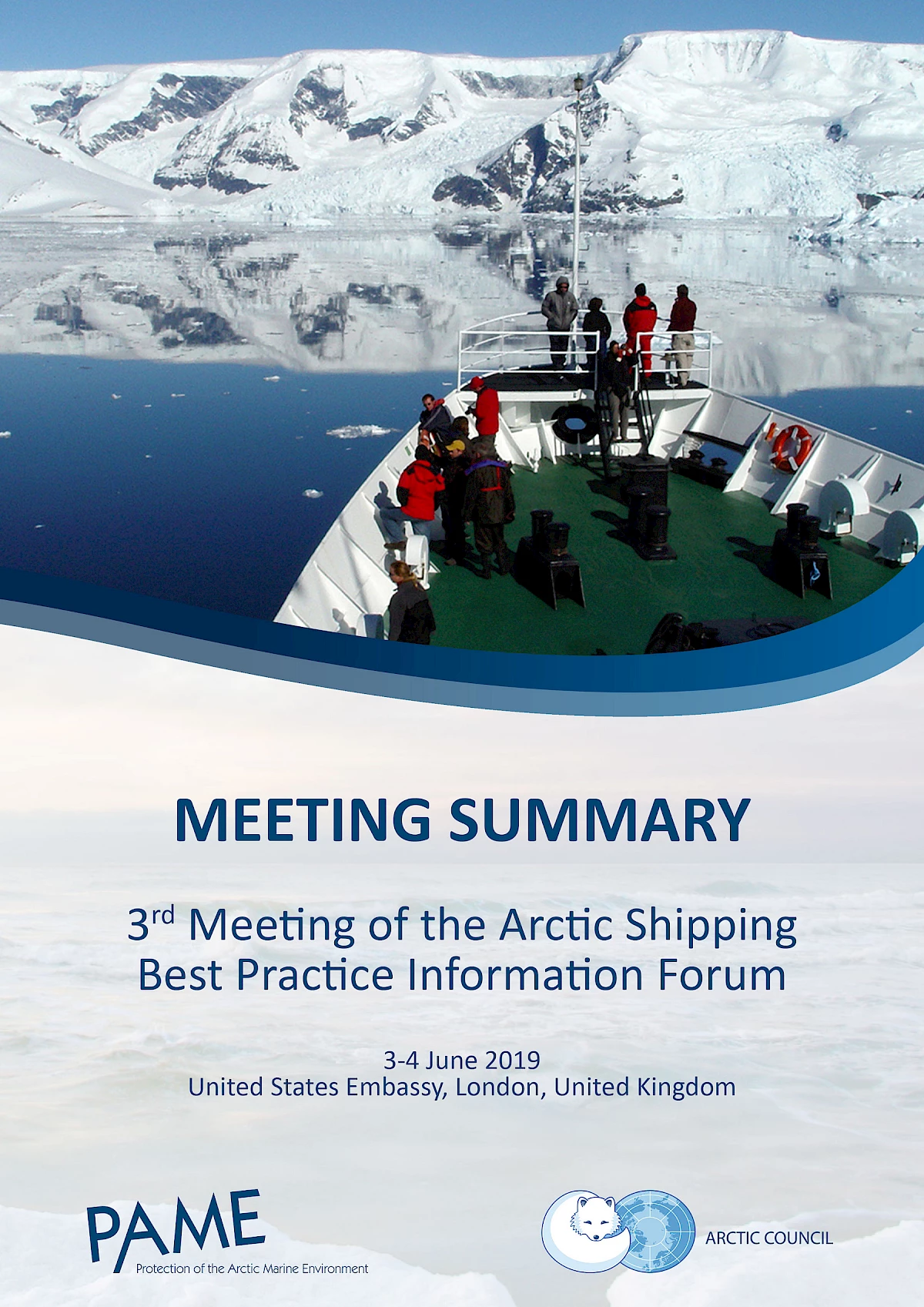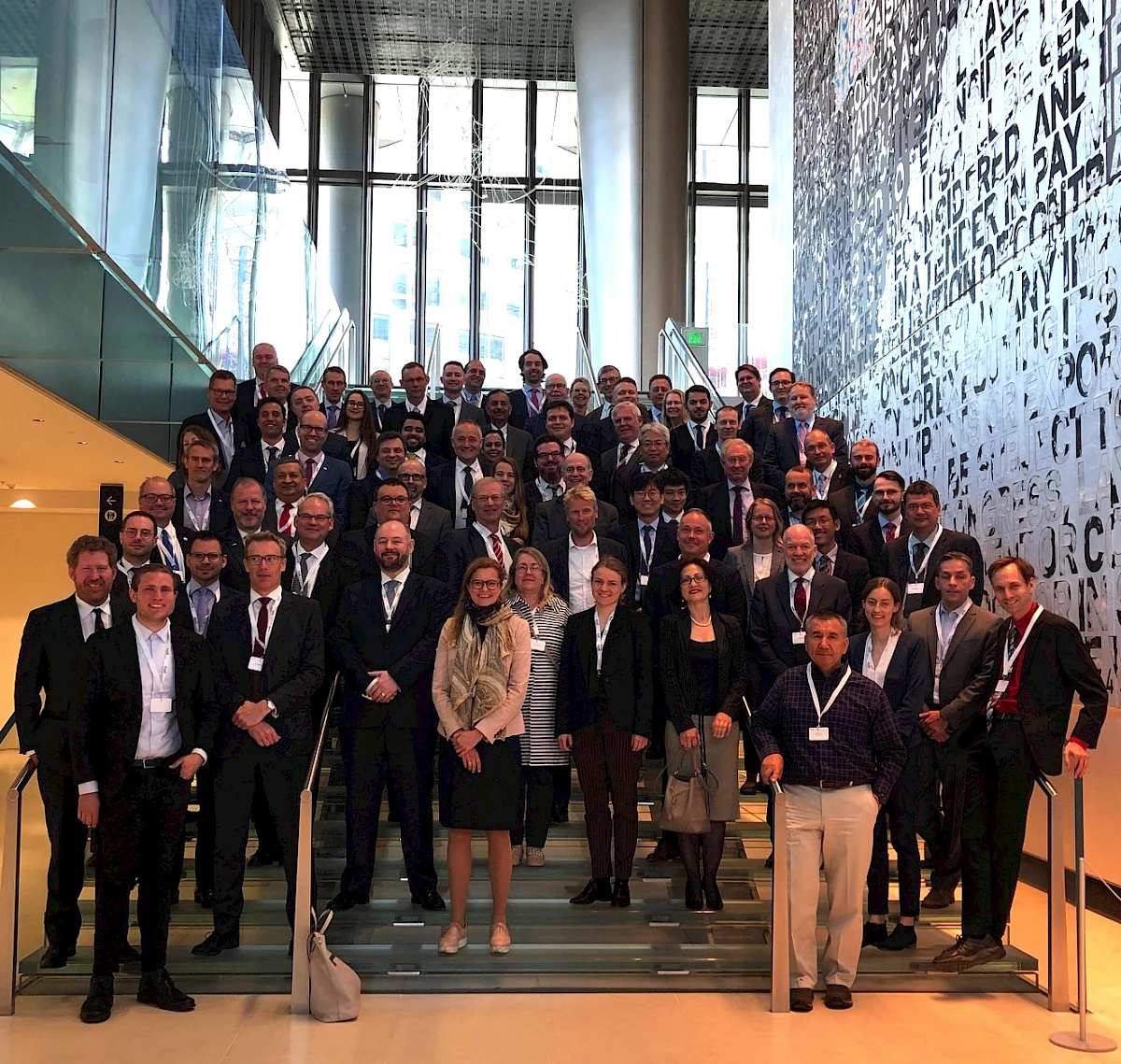Third meeting of the Forum
Location: Embassy of the United States, London
Date: 3-4 June, 2019
Chair: Mr. Sverrir Konráðsson, Iceland
Theme: From Theory to Practice
Agenda: Download here.
Registrations: Download here
Meeting press release: See here.
Meeting summary report: Download here
Meeting Summary
The Arctic Council’s Arctic Shipping Best Practice Information Forum (the Forum) convened on 3-4 June 2019 for the third time since its inception in 2017, and for the first time since Iceland assumed Chairmanship of the Arctic Council. ‘From Theory to Practice’ was the overarching theme of the meeting with presentations oriented around practical experiences in implementing the Polar Code, with a particular focus on successes, impediments, and remaining challenges. The meeting commenced with opening remarks by distinguished delegates, including a video address by the Secretary-General of the IMO.
Over the course of the day-and-a-half meeting, presentations focused on the unique experiences gained by Arctic States, shipowners, classification societies and intergovernmental organizations in implementing, complying with and/or making information available to support implementation of or compliance with the Polar Code.
Representatives of the Forums’ Organizing Committee jointly presented on the development of the web portal (www.arcticshippingforum.is), identifying changes in design and layout (based largely on user feedback), and noting the overall increase in web traffic since initially launching. The presenters also highlighted the significant increase in hyperlink submissions, as well as the time and effort required to maintain and update this information online. This prompted discussions on the long-termsustainability of the Forum and the need for further financial or in-kind support.
Indeed, before the meeting concluded, participants discussed the scheduling, logistics, and funding of future annual Forum meetings. There was a general recognition that additional support, including financial contributions, are necessary to help ensure the continued viability and vitality of Forum meetings. The Forum Coordinating Committee indicated its receptiveness to such support and committed to determining how any offers of financial contributions could be accepted consistent with applicable Arctic Council Rules.
The first focus session was on progress made to date in implementing the Polar Code. The International Chamber of Shipping (ICS) and the Oil Companies International Marine Forum (OCIMF) provided an update on additional guidance under development in support of Polar Water Operations Manuals, whereas Aker Arctic advised on POLARIS – a methodology for determining a ship’s operational capabilities and limitation in ice – noting the possible role the Forum could play in validating its efficacy. A new PAME effort to compile information on how Arctic States and Observer States understand and apply in practice the Polar Code was presented by Norway. A panel discussion focused on Polar Code implementation closed out this first session, with representatives from Stena, the American Bureau of Shipping (ABS) and Lloyd’s Register joining the session presenters.
Building on the previous panel discussion, a second session on Polar Code implementation challenges followed focused primarily on efforts currently under way within various IMO sub-committees to address Polar Code provisions requiring further guidance or clarity. A representative of the IMO’s Maritime Safety Division highlighted work on communications at high latitudes, and efforts being undertaken by the IMO Sub-Committee on Navigation, Communications and Search and Rescue (NCSR) to enhance the safety and efficiency of navigation via performance standards for navigation and communications equipment. Similarly, a representative from the Norwegian Maritime Authority spoke on efforts by the IMO Sub-Committee on Ships Systems and Equipment (SSE) to develop guidelines on life-saving appliances and arrangement for ships operating in polar waters. A panel discussion closed out this session, with a representative from DNV-GL joining to discuss Polar Code provisions considered challenging to meet, including provisions on maximum expected time of rescue.
The Human Element was a significant thread running throughout all discussions, though one culminating in its own dedicated focus session. A representative from the University of Stavanger presented on lessons learned from recent Norwegian Search and Rescue Exercises, particularly with respect to factors affecting survivability in Polar Regions. A presentation from the Russian Federation focused specifically on the crewing and training provisions contained in the Polar Code, while a representative from the Nautical Institute spoke on the importance of operator experience and consistent training and the benefits associated with Ice Navigators.
An operator perspective was provided through a presentation by V.Ships Leisure S.A.M., underscoring the critical importance of training in reducing maritime accidents. A representative of the Arctic Coast Guard Forum accompanied the aforementioned presenters in a panel discussion that covered topics ranging from the application of indigenous knowledge, survivability, and concerns with inexperienced operators.
The second day of the meeting began with a panel session on voyage planning. A joint presentation by the Clean Arctic Alliance and Environmental Investigation Agency focused on the need for vessel operators to be aware of local marine mammals, potential impacts (e.g. pollution, noise, strikes) from shipping, and how the Forum can assist with mitigating these impacts. A representative from the
Aborigin Forum highlighted the importance to indigenous people of sea ice and wildlife both on and under it. ABS concluded the session with a comprehensive presentation on applying the Polar Code (e.g., conducting operational assessments), some of the trends encountered with respect to destination and transit shipping, and ice design in shipbuilding. A representative from Lloyd’s Market Association joined the panellists for a wide-ranging discussion covering insurance premiums, the consequences of an HFO ban in the Arctic, and POLARIS.
The final presentation was from the perspective of a maritime student using information contained within the Forum’s web portal to conduct virtual voyage planning along the Northern Sea Route, and the benefits and shortcomings of the information contained therein.
 Arctic Council Working Group
Arctic Council Working Group 
